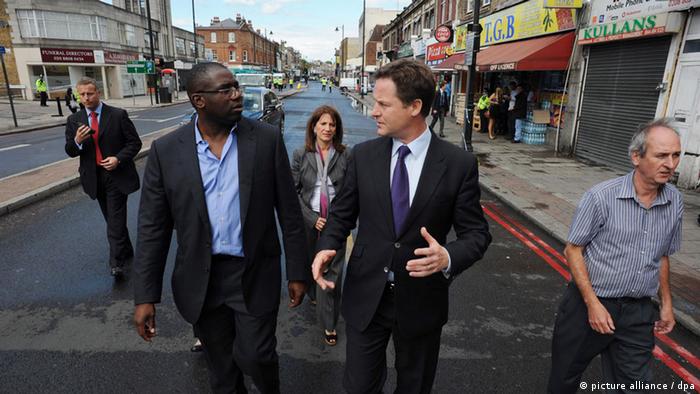奧運結束了…英國人苦日子得再忍8年
2012-08
Web only
作者:吳凱琳
 圖片來源:邱劍英
圖片來源:邱劍英
倫敦奧運結束,除了過程中的小瑕疵之外,這次奧運出奇順利,再加上奪牌的好成績。也使得英國的氣勢開低走高。但17天的奧運落幕,就如同一場華麗盛宴的結束,一切回到了殘酷的現實。
再多的獎牌,對英國經濟的復甦沒有絲毫的助益。
從金融風暴到歐債危機,英國經濟一而再、再而三地受到重創。受傷的英國經濟,要恢復到原有的正常水準,恐怕得等到2020年之後。原本預計花費5年時間的進行撙節計劃,希望能成功挽救經濟。但是依目前情況,恐怕復原時間要比5年還要長。
過去9個月以來,英國經濟持續萎縮,政府債務已經超出1兆英鎊,而且佔國內生產毛額(GDP)的90%以上。
自2007年開始,英鎊已經貶值20%,再加上營業稅以及原物料價格的攀升,導致產品價格節節升高,抵銷了薪資的成長。全英國家庭的債務已經高達1.5兆英鎊,幾乎等同於一年的國內生產總額。
即使是中等收入的消費者,購買力比危機發生前降低了7%。而年輕人是這次受傷最重的族群,英國年輕人的失業率已經突破20%,遠遠超出整體失業率8%。
歷經了短暫的歡樂,但英國人要真正過上好生活,還得繼續忍受長達8年的苦日子。
【新聞來源】
REUTERS -
After Olympics boost, Britons face austerity to 2020
* Government has few alternatives to austerity
By Sven Egenter
LONDON, Aug 13 (Reuters) - After the party, the hangover
looms: London's golden Olympics may soon be a distant memory as
Britain returns to the reality of its economic mess and years of
more belt tightening.
The 2012 Games have lifted the nation's spirits, but the
government has few alternatives to an austerity drive that may
last for the rest of this decade - although some academics and
economists believe yet more radical policies may be needed.
"Quite frankly the Olympics is helping to paper over the
fact that we are on the verge of a depression," said Simon Lee,
senior politics lecturer at the University of Hull. "If the
economy goes into freefall, then politicians desperate to get
re-elected will discover that they can do much more radical
things in the national interest."
Few economists share Lee's belief that Britain will suffer a
1930s-style depression. Nevertheless, it will take years to heal
the economy's scars from the global financial crisis, the euro
zone's turmoil and the drive to slash a huge budget deficit.
"Unlike the Olympians who have thrilled us over the past
fortnight, our economy has not yet reached full fitness," Bank
of England Governor Mervyn King said last week.
"The recovery and rebalancing of our economy will be a long,
slow process," he said, warning that Britain may take at least
two more years to return just to the levels of output it already
achieved before the financial crisis struck four years ago.
Britain's last great economic mess, the inflation- and
strike-ridden 1970s, propelled Margaret Thatcher to power and
led to a decade of painful change.
Now radical ideas, albeit some very different from the
Thatcher reforms, are being floated again to haul Britain back
up. Many people believe that some taboos will have to be broken
to fix Britain's problems.
For the Bank of England - which has already pumped huge sums
into the financial system by buying government bonds from
commercial banks - this might mean purchasing loans and
mortgages with newly-created money from lenders.
For the government, it might mean turning Thatcher's free
market ideology on its head with measures such as fully
nationalising the Royal Bank of Scotland.
DIRE MESSAGE?
The Bank of England is now factoring in that the crisis has
destroyed some of the economy's ability to grow without stoking
inflation.
If this is correct, the message is dire: there may be less
room for the central bank to pump easy money into the economy in
the future. Likewise, more of the hole in public finances could
be structural, needing a permanent fix, rather than a temporary
problem that will disappear when growth returns.
This would allow for even less government spending. Prime
Minister David Cameron has already warned that austerity,
initially planned to take five years, could last until 2020.
Finance minister George Osborne has launched a flurry of
measures to get credit flowing and boost infrastructure
investment without directly spending taxpayers' money. But the
public increasingly doubts the coalition of Conservatives and
Liberal Democrats can get the country moving.
Notwithstanding the Olympic boost, the economic mood among
the 62 million people in Britain has been rock-bottom for most
of the past four years. Finding an economic fix remains Britons'
top priority, said Gideon Skinner from polling firm Ipsos MORI.
The economy has shrunk for the last nine months and now
produces 4.5 percent less than before the crisis. Government
debt is well above 1 trillion pounds and is predicted to rise
above 90 percent of GDP even with the austerity policies.
Many Britons have experienced the worst squeeze in their
living standards since the dark 1970s.
"Everything's a struggle. The mortgage is extortionate,
electricity bills are hitting the roof and it's generally not
great," says
Francesca Woolloff, a 25-year-old accounts
assistant in insurance, taking a smoking break outside her
office in London's City financial district.
A 20 percent drop in the pound's value since 2007, an
increase in sales tax and climbing costs of raw materials and
oil have driven up consumer prices, eating into meagre wage
rises and hurting the poorest most.
Even middle-income earners will have seen 7 percent of their
spending power wiped out by the end of this year compared with
pre-crisis levels, the Institute for Fiscal Studies estimated.
The crisis has hit young people the hardest and youth
unemployment has soared above 20 percent. Young families are
also scaling back spending to meet banks' demands for higher
deposits when they take out a mortgage loan to buy a home, an
aspiration ingrained in the national psyche.
Britons must also save more for their retirement as pension
schemes suffer the effects of record-low interest rates.
All this makes a return to the pre-crisis consumerism funded
by the credit card unlikely. Total household debt is still 1.5
trillion pounds, equal to total annual gross domestic product.
BANKS
Ditching austerity is unlikely, as repairing public finances
is the glue that holds the coalition together and Osborne has
staked his reputation on defending Britain's top credit rating.
Much discussions now revolves around what economists at
think tank NIESR called a dysfunctional banking system.
British bankers have aroused public anger since taxpayers
had to bail-out several large lenders. A string of scandals and
multi-million pound bonus payments have only made things worse.
As the banks try to clean up their balance sheets, they have
become much more restrictive than before the crisis. The lack of
lending may have already hurt the country's growth potential,
the central bank warned last week.
Together with the government, the central bank launched an
80 billion pound scheme to lower banks' funding costs if they
keep up lending, but more radical solutions are gaining ground.
Business Secretary Vince Cable, a Liberal Democrat cabinet
member, seems sympathetic to fully nationalising RBS - which is
already over 80 percent state-owned - to create a business bank
and lend more to small firms suffering in the recession.
However, Osborne's long-standing goal remains to sell the bank
back into private ownership.
"Nationalisation does not come without its costs or risks -
but it might prove the only way to get lending flowing again if
all other attempts fail," said Vicky Redwood from Capital
Economics.
Adam Posen, a departing external member of the central
bank's Monetary Policy Committee, has called on Governor King to
drop his opposition to buying assets such as loans and mortgages
with newly-created money from the banks directly to unblock
lending.
"I personally view the teeth-gnashing and garment-rending
about what's fiscal and monetary as too much drama for too
little content," Posen told the Financial Times.
POLITICAL BATTLE
A political battle is raging over who is to blame for the
mess. The Labour opposition has gained public support by saying
the government's plan to cut one of the largest budget deficits
in the world within five years has strangled the recovery.
Osborne has pointed to the
euro zone debt crisis and blames
the legacy of the previous Labour government's lavish spending,
plus reckless lending by the country's oversized banks.
The NIESR think tank has been calling for a relaxation of
the austerity drive. It calculates that launching the budget
cuts in 2010 will cost 239 billion pounds in lost output over 10
years compared with if the austerity had begun in 2014.
Britain is acutely susceptible to the euro zone crisis.
"Half of what the UK exports goes to the euro zone, UK banking
exposure is massive; if the euro zone goes belly up UK banks are
in big trouble," said ING economist James Knightley.
"That's why UK companies, which sit on massive amounts of
cash, are not going to invest when confidence is so low and the
risks from the euro zone so large," he said.
NOT ALL GLOOM
Britain has seen only limited protests compared with
Greece
and Spain, at the centre of the euro zone crisis. However, some
observers saw riots in London last year, when thousands of
mainly young people looted shops, as a writing on the wall.
But in one of the richest countries in the world, many
people still enjoy a good life: Department store John Lewis,
which offers all the brands for a middle-class life in style,
has recorded double-digit growth rates throughout this year.
The government's push to rebalance the economy away from
consumer spending to export-led growth is showing some success.
Inflation is also falling, easing the squeeze on incomes.
The Bank of England's policy of keeping rates at the
record-low of 0.5 percent and pumping 375 billion pounds of
newly created money into the economy has helped to ease the
crisis.
Unemployment has even started to fall and at 8.1 percent is
now lower than in the faster growing United States. But how the
economy created 180,000 new jobs over the three months to May
remains just a mystery.
Many economists and business lobbies simply don't believe
the size of the officially-reported drop in output in the second
quarter. A near 10 percent decline in construction output over
the first half of 2012 has been met with particular disbelief.
OUTSIDE LONDON
Outside London and the wealthy southeast England, life
remains uncertain. "It is still fairly tough whichever sector
you are in," said Graham Morgan from the South Wales Chambers of
Commerce. "The average business is very worried what the next
6-12 months will look like."
Wales has been particularly dependent on public spending,
suffering now from cuts in infrastructure spending as well as a
lack of homebuilding.
Mark Davies, Managing Director of LBS Builders Merchants,
said customers from the construction industry face severe
strains as more firms bid for the few contracts up for grabs.
Family-owned LBS which employs over 200 staff, has actually
added branches as the big national builders' merchants reduce
their presence in Wales, Davies said.
For the Welsh business community, the main obstacle is a
lack of finance. "The general feeling from businesses is that
banks are taking a very, very tough line," said Morgan from the
chamber of commerce. "Those with reasonably good ideas that are
untested are just not getting the businesses off the ground."
Davies agreed: "Smaller contractors and developers are
completely frozen out of the market."
英国外交大臣威廉·黑格(William Hague)周五(8月10日)表示,
英国将向叙利亚反对派提供5百万英镑的“非致命性”援助。
黑格称,在外交努力缺乏进展的情况下,
英国希望扩大对叙利亚人民和叙利亚反对派的援助,
保护非武装反政府组织、人权活动人士和一般市民远离暴力危险。
援助内容为技术设备、收音机和医疗用品,但不包括武器。
英国外交大臣说,这一项举措标志着英国对叙利亚政治态度的转变,
但不代表英方偏袒叙利亚内战中的任何一方。
一名外交部发言人稍早前证实,
英国政府正与自由叙利亚军的政治组织会谈。他进一步表示,
叙利亚正面临全面失控以及权力真空的巨大威胁,
英国必须与未来可能掌控叙利亚的一方建立关系。
----
2008.12.13
BBC
《每日郵報》的頭版大字標題說:"別再談經濟了!"
該報說,德國對布朗的"嚴厲責罵"讓倫敦和柏林的陷入了外交爭執。
該報又說,這場外交戰是"布朗發表挽救世界免於金融危機的大計,引來德國痛罵"。
《獨立報》發表在野保守黨影子財政大臣奧斯本的文章。他說,在同一個星期,布朗聲言他在挽救世界,現在世界反唇相譏。
《每日電訊報》訪問了保守黨主席卡梅隆,他承諾保守黨在下一屆大選中一旦當選,將協助老年銀行存戶。
他形容這些銀行存戶為金融危機中"被遺忘的受害者"。
研究學者研究制定了一項增強胎兒肺部功能的任務。
在一項老鼠試驗中顯示,廣為認識的“鈣感受器”分子為促進胎兒肺部生長起重要作用。
威爾士卡迪夫大學研究學者說,針對鈣感受器的藥物已被提煉出來。
《生理學雜誌》刊登了這一結果,這也意味著早產嬰兒的身體狀況也許會得到改善。
肺部生長的最後階段是在懷孕的後期,所以早產常導致嬰兒出現吸氧量低的問題,更有可能導致長期的肺部疾病。
最近的研究發現,鈣感受器成功開啟了胎兒肺部的生長功能。
在研究中,研究者證實可以靠人工影響接收器功能來促進肺部的生長。
研究者說,下一步計劃就是要為鈣感受器變異導致它永久失靈或者接通的患者做研究試驗。
研究報告的作者保羅﹒坎普教授說,如果發現這種變異和產後肺部健康狀況相互作用,他們將進行臨床試驗。
坎普教授說,最令人激動的是,能調節鈣感受器功能的藥物早已存在。
他說,如果能證明其中的任何一種藥物可以調節鈣感受器在肺部的作用,那它便可以用來完善早產嬰兒肺部功能。
坎普教授指出,證明一項已有的藥物有效,要比證明新藥物所需的時間短。
他說,這種療法可以和治療有早產危機嬰兒的類固醇治療同時進行。
兒童慈善機構“湯米”的助產士安妮特﹒布瑞雷說,長期肺部疾病是早產嬰兒面臨的一個主要病症,影響更可能延續至他們長大成人之後。
布瑞雷強調,雖然這項研究已經取得了驕人的成果,但未來仍需要透過隨機的控制試驗來評估藥物對於早產嬰兒的藥效。
《每日電訊報》報道,多塞特郡一名牧師禁止詩歌班唱一首傳誦一時的基督教聖誕詩歌《美哉小城小伯利恆》,因為其中一句說:"你是何等清靜"。
這位牧師說,這首詩歌反映不了這個苦難城市現代的實際情況。
另一方面,多份報章報道了埃塞克斯郡一個"冬季節日"表演節目禁止一所小學詩歌班唱傳統聖誕詩歌,因為這些詩歌被認為"宗教意味太濃厚"。

 Some 3,000 volunteers are taking part in the show, which organisers have entitled Enlightenment
Some 3,000 volunteers are taking part in the show, which organisers have entitled Enlightenment













 David Lammy shows Deputy Prime Minister Nick Clegg around the streets of Tottenham
David Lammy shows Deputy Prime Minister Nick Clegg around the streets of Tottenham The House of Reeves store was over 100 years old when it burned down
The House of Reeves store was over 100 years old when it burned down The violence spread to other cities, including Manchester
The violence spread to other cities, including Manchester





